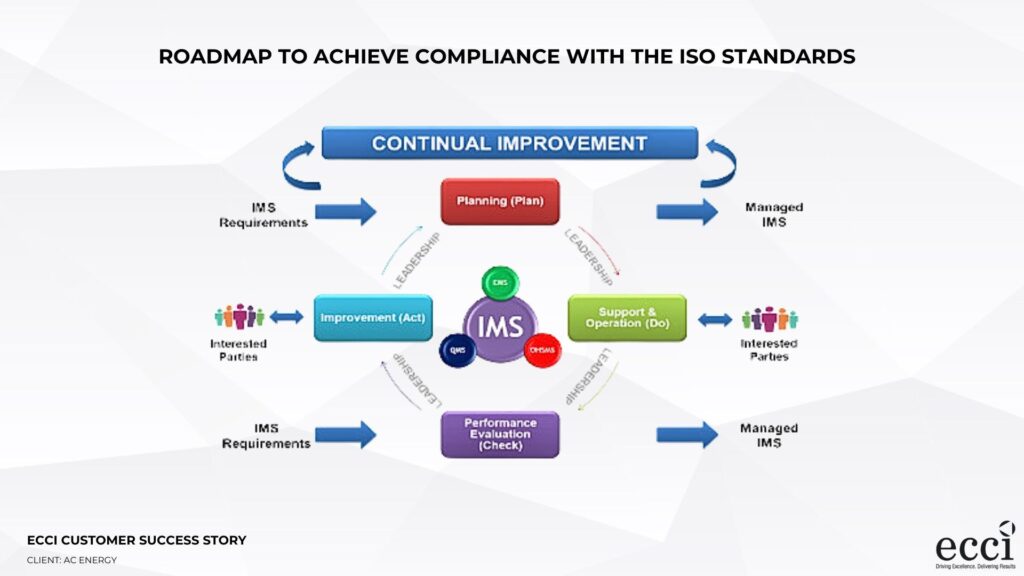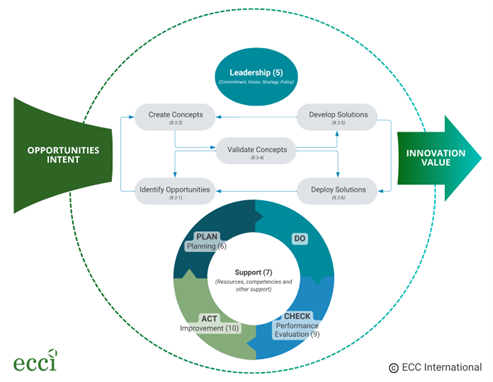Introduction
AC Energy, a subsidiary of the Ayala Group, is a prominent player in the energy sector, specializing in both renewable energy and conventional power plants. Committed to sustainable growth, AC Energy envisions achieving over 5 GW of attributable capacity and generating at least 50% of its energy from renewables by 2025. This dedication to sustainability drives AC Energy to continually improve its operations, processes, and overall excellence.
Context and Challenge
As part of its commitment to sustainability, AC Energy sought to comply with the following ISO standards:
- ISO 9001:2015, Quality Management Systems
- ISO 14001:2015, Environmental Management Systems
- ISO 45001:2018, Occupational Health and Safety Management Systems
This project was carried out in three phases, covering three solar plants (Montesol, Islasol, Sacasol), three wind farms (NLR, NW, GW), and four conventional plants (SLTEC, One Subic, Bulacan Power, and CIP II) across the country.
Solution
AC Energy was implementing an IMS to achieve compliance with the above ISO standards. An IMS is a single management system that integrates the requirements of multiple standards. This approach would allow AC Energy to manage its quality, environmental, and occupational health and safety risks in a more holistic and efficient manner.
The implementation of the IMS was a complex and challenging project. However, AC Energy was committed to achieving its goals and was confident that the benefits of compliance would outweigh the challenges.
ECCI was engaged by AC Energy to provide guidance and support during the implementation of the IMS. ECCI began by conducting a gap assessment to evaluate AC Energy’s existing processes and systems in relation to the ISO standards. The gap assessment identified the areas where AC Energy’s processes and systems needed to be improved.
Based on the findings of the gap assessment, ECCI developed an integrated management framework. The framework provided a roadmap for AC Energy to achieve compliance with the ISO standards.

ECCI also worked with AC Energy to align its documentation with the ISO standards. This included updating policies, procedures, and work instructions.
Close collaboration between AC Energy and ECCI ensured that the IMS was implemented effectively and efficiently. The IMS is now fully compliant with the ISO standards, and AC Energy is confident that it will continue to improve its quality, environmental, and occupational health and safety performance.
Challenges and Success Factors
The implementation of the IMS presented AC Energy with a number of challenges, including:
- Organizational change management: The IMS required a significant change in the way that AC Energy operated. This necessitated the company to invest in training and communication to ensure that all employees were on board with the changes.
- Securing employee buy-in: The success of the IMS depended on the commitment of all employees. Thus, AC Energy worked hard to secure employee buy-in by communicating the benefits of compliance and involving employees in the implementation process.
- Aligning existing processes with ISO requirements: The IMS required AC Energy to align its existing processes with the requirements of the ISO standards. This was a complex and time-consuming process, but AC Energy made significant progress.
Benefits and Impact
ECCI’s engagement not only successfully met the planned goals for the IMS implementation but also delivered the following key benefits for AC Energy:
- Improved quality of products and services: The IMS helped AC Energy significantly improve the quality of its products and services by implementing systematic processes and procedures.
- Enhanced environmental performance: The IMS helped AC Energy reduce its environmental impact by implementing measures to conserve energy, reduce waste, and manage emissions.
- Improved occupational health and safety: AC Energy is poised to fortify its commitment to the health and safety of its workforce by implementing proactive measures aimed at accident prevention and injury mitigation.
- Heightened competitive edge: By adhering to ISO standards, AC Energy is primed to bolster its competitive standing in the market by demonstrating its commitment to quality, environmental, and occupational health and safety.
- Increased investor confidence: Compliance with the ISO standards will increase investor confidence in AC Energy by showcasing its commitment to good governance and risk management.
Conclusion
AC Energy is well on its way to achieving its goal of sustainable growth through ISO compliance. The company is committed to the long-term benefits of compliance and is confident that the challenges will be outweighed by the rewards. The implementation of the IMS is a significant milestone for AC Energy and has positioned the company to achieve its sustainability goals and become a responsible and agile energy leader.
Get in touch
Discover how ECCI can support you in achieving sustainable growth through ISO compliance. Kickstart your journey by reaching out to us and scheduling your advisory session.
Interested in learning more about our services? Visit our website for all the information.









